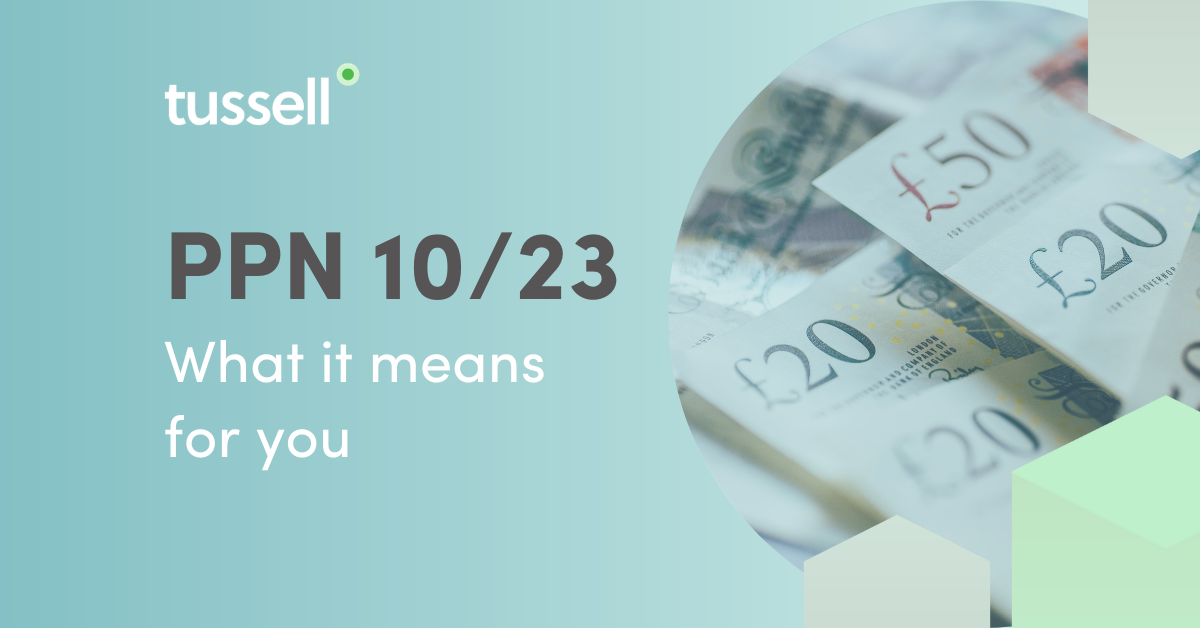In November 2023, the Cabinet Office published Procurement Policy Note (PPN) 10/23: Taking account of a bidder’s approach to payment in the procurement of major contracts.
This PPN raises the bar for how promptly bidders must pay their supply chain invoices before being awarded certain high-value contracts.
It's vital that in-scope contracting authorities recognise this change.
In this quick-fire blog, we summarise what changes the PPN introduces, and what it means for you.
💡 What changes does PPN 10/23 introduce?
PPN 10/23 changes expectations for how promptly bidders must pay their supply-chain before being eligible for large government contracts.
PPN 10/23 only applies to Central Government departments, their Executive Agencies and Non-Departmental Public Bodies.
Of these public bodies' contracts, it only applies to those with an anticipated contract value of over £5 million per year (exc VAT), barring certain contracts under exceptional circumstances as per PCR 2015.
The PPN also applies to contracts with a projected value over £5 million (exc VAT) awarded via framework agreements or Dynamic Purchasing Systems.
As part of the selection process for these high-value contracts, past PPN 08/21 stipulated that bidders are only eligible if they:
-
Pay 95% of their supply chain's invoices within 60 days.
-
Pay 90% if they have an action plan in place.
-
PPN 10/23 retains these requirements but adds that bidders must:
-
Pay 100% of their supply chain's invoices within an average of 55 days.
Specifically, this amends the requirements established under the current iteration of the Standard Selection Questionnaire, as documented in PPN 03/23.
PPN 10/23 also lays out in more detail the exemptions under which these prompt payment requirements are not necessary. Its accompanying Guidance Document explains that PPN 10/23 may not be "relevant or proportional" when:
-
The market for a given contract "is distorted / narrowed / struggling" to such an extent that contract delivery is put at risk, or "value for money is likely to be severely compromised".
-
There is a civil emergency.
After an exemption request is submitted to the Commercial Policy Team in the Cabinet Office, it will be assessed and recommended to the relevant Cabinet Office Minister if deemed necessary.
Relevant contracting authorities will need to enforce this additional requirement from April 1st 2024.
❓ Why is PPN 10/23 being introduced?
PPN 10/23 puts greater expectations on how consistently suppliers must be paying their supply chain before being entitled to work on larger government contracts.
The average payment requirement introduced by PPN 10/23 was first announced as part of the government's 2023 Autumn Statement.
Under its 'Supercharging growth of the UK's SMEs' section, the Autumn Statement confirmed that from "April 2024, firms bidding for government contracts over £5 million will have to demonstrate they pay their own invoices within an average of 55 days".
Interestingly, the Autumn Statement also confirmed that the average payment requirement would be tightened to 45 days in April 2025, "and to 30 days in the coming years."
If followed through, PPN 10/23 represents the first of a series of measures desired to weed out delayed payments throughout their bidders' supply chains. The hope is this will provide the cashflow stability SMEs need to survive and grow.
🔮 What next?
Relevant contracting authorities will need to start enforcing PPN 10/23 from April 1st 2024.
If you're part of an in-scope organisation, this should give your team ample time to engrain this extra step into your bid assessment process.
It may be worth signalling to your incumbent suppliers and your supplier community of this incoming requirement. This should provide them time to gather evidence showing their prompt payment history - or, time to set an action plan in place to remedy slow payments.
The 2023 Autumn Statement indicates that expectations placed on suppliers will only increase in the years ahead. Again, it's worth setting these expectations early with bidders.
Even if you're not working within an in-scope authority, promoting prompt supply chain payments among your bidders is a productive pursuit. Using PPN 10/23 - and subsequent updates - as a baseline, you could introduce evidencing prompt payments within your bidding process.
To read in more depth about how to assess bidders against these new requirements, read the Cabinet Office's Guidance Document.
*
To read the latest Procurement Policy Note for yourself, click here.
Behind on your PPN knowledge? Find all of our comprehensive PPN explainers below:
- PPN 08/23: Using Standard Contracts
- PPN 07/23: Government Security Classifications Policy 2023
- PPN 05/23: Implementing new Free Trade Agreements
- PPN 01/23: Requirements to publish on Contracts Finder
- PPN 08/21: Taking account of a bidder's approach to payment in the procurement of major government contracts
- PPN 06/21: Taking account of Carbon Reduction Plans in the procurement of major government contracts
- PPN 05/21: National Procurement Policy Statement



%20v1.png)
![New Nav Bar - New Tag [Gov]](https://www.tussell.com/hubfs/New%20Nav%20Bar%20-%20New%20Tag%20%5BGov%5D.png)
![[Gov] New Nav CTA - Product, Frameworks Finder (rounded) v1](https://www.tussell.com/hubfs/%5BGov%5D%20New%20Nav%20CTA%20-%20Product%2c%20Frameworks%20Finder%20(rounded)%20v1.png)


.png?width=80&height=80&name=james%20v2%20(1).png)

![New Nav Bar, Insights - Strategic Suppliers 2025 [Gov] v2](https://www.tussell.com/hs-fs/hubfs/New%20Nav%20Bar%2c%20Insights%20-%20Strategic%20Suppliers%202025%20%5BGov%5D%20v2.png?width=600&height=600&name=New%20Nav%20Bar%2c%20Insights%20-%20Strategic%20Suppliers%202025%20%5BGov%5D%20v2.png)





.png?width=800&height=450&name=PPN%200224%20(1).png)